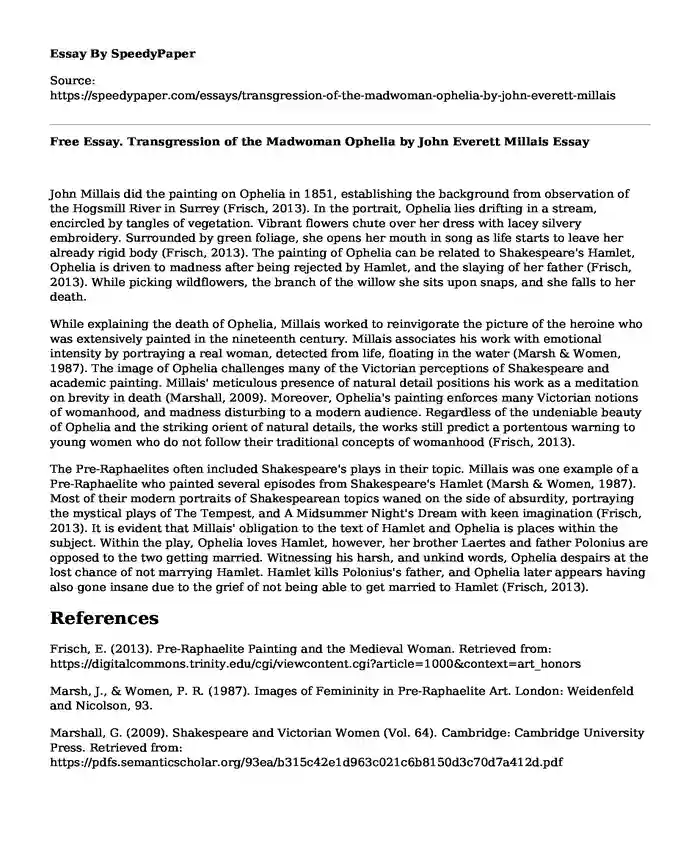
| Type of paper: | Creative writing |
| Categories: | Inspiration Arts Shakespeare |
| Pages: | 2 |
| Wordcount: | 442 words |
John Millais did the painting on Ophelia in 1851, establishing the background from observation of the Hogsmill River in Surrey (Frisch, 2013). In the portrait, Ophelia lies drifting in a stream, encircled by tangles of vegetation. Vibrant flowers chute over her dress with lacey silvery embroidery. Surrounded by green foliage, she opens her mouth in song as life starts to leave her already rigid body (Frisch, 2013). The painting of Ophelia can be related to Shakespeare's Hamlet, Ophelia is driven to madness after being rejected by Hamlet, and the slaying of her father (Frisch, 2013). While picking wildflowers, the branch of the willow she sits upon snaps, and she falls to her death.
While explaining the death of Ophelia, Millais worked to reinvigorate the picture of the heroine who was extensively painted in the nineteenth century. Millais associates his work with emotional intensity by portraying a real woman, detected from life, floating in the water (Marsh & Women, 1987). The image of Ophelia challenges many of the Victorian perceptions of Shakespeare and academic painting. Millais' meticulous presence of natural detail positions his work as a meditation on brevity in death (Marshall, 2009). Moreover, Ophelia's painting enforces many Victorian notions of womanhood, and madness disturbing to a modern audience. Regardless of the undeniable beauty of Ophelia and the striking orient of natural details, the works still predict a portentous warning to young women who do not follow their traditional concepts of womanhood (Frisch, 2013).
The Pre-Raphaelites often included Shakespeare's plays in their topic. Millais was one example of a Pre-Raphaelite who painted several episodes from Shakespeare's Hamlet (Marsh & Women, 1987). Most of their modern portraits of Shakespearean topics waned on the side of absurdity, portraying the mystical plays of The Tempest, and A Midsummer Night's Dream with keen imagination (Frisch, 2013). It is evident that Millais' obligation to the text of Hamlet and Ophelia is places within the subject. Within the play, Ophelia loves Hamlet, however, her brother Laertes and father Polonius are opposed to the two getting married. Witnessing his harsh, and unkind words, Ophelia despairs at the lost chance of not marrying Hamlet. Hamlet kills Polonius's father, and Ophelia later appears having also gone insane due to the grief of not being able to get married to Hamlet (Frisch, 2013).
References
Frisch, E. (2013). Pre-Raphaelite Painting and the Medieval Woman. Retrieved from: https://digitalcommons.trinity.edu/cgi/viewcontent.cgi?article=1000&context=art_honors
Marsh, J., & Women, P. R. (1987). Images of Femininity in Pre-Raphaelite Art. London: Weidenfeld and Nicolson, 93.
Marshall, G. (2009). Shakespeare and Victorian Women (Vol. 64). Cambridge: Cambridge University Press. Retrieved from: https://pdfs.semanticscholar.org/93ea/b315c42e1d963c021c6b8150d3c70d7a412d.pdf
Cite this page
Free Essay. Transgression of the Madwoman Ophelia by John Everett Millais. (2023, Apr 03). Retrieved from https://speedypaper.net/essays/transgression-of-the-madwoman-ophelia-by-john-everett-millais
Request Removal
If you are the original author of this essay and no longer wish to have it published on the SpeedyPaper website, please click below to request its removal:
- How Do You Find Inspiration for Writing
- Free Essay Sample about Short Fiction of Kate Chopin
- Essay Sample with a Letter of Application
- Ockham Technologies Case Study. Free Essay.
- Banning Bottled Water in Canada - Free Essay on Environmental Problems
- A Visit to Newgate, Essay Example for Everyone
- Essay Sample: Contingency Planning, Managing Health and Safety in the Workplace
Popular categories




